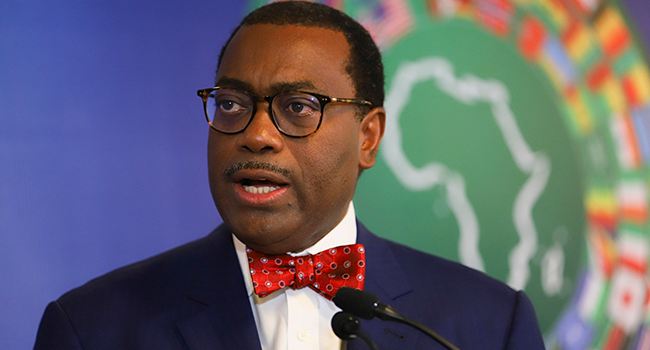African Development Bank President Applauds Regional Development Strategy in Nigeria
To further cooperation and exploit Nigeria’s tremendous agricultural potential, seven recently elected governors travelled to Abidjan to meet with African Development Bank (AfDB) Group President Akinwumi Adesina.
According to a Saturday bank statement, Katsina State Governor Dikko Radda headed the delegation.
Members of the delegation included governors including Kebbi State’s Nasiru Idris, Jigawa State’s Alhaji Umar Namadi, and Zamfara State’s Dr. Dauda Lawal.
The team also included the deputy governors of Kano, Dr. Hadiza Balarabe, Kaduna’s Dr. Idris Gobir, and Sokoto’s Aminu Abdussalam.
About ten million of Nigeria’s 22 million cattle live in North West Nigeria, which is home to an estimated 60 million people (or 28 percent of the country’s population).
Discussions in Abidjan centred on new approaches to unlocking the region’s vast agricultural potential, with a particular emphasis on increasing food production, nutrition, and security.
It also sought to make use of the African Development Bank’s (AfDB) renewable energy initiatives and speed up the establishment of Special Agro-industrial Processing Zones (SAPZs).
Adesina commended the North West Governors on their regional approach and assured them that the Bank will back the creation of a regional strategy.
According to the AfDB president, the bank and its partners planned to invest one billion dollars to help 25 of Nigeria’s 36 states participate in the SAPZ scheme.
Adesina pushed the governors to work together and pick agricultural hubs to house the programmes quickly.
The AfDB president claims that the bank is helping the government of Nigeria lower food and energy costs.
Local farmers will reap the benefits of these zones, and people will find work across the value chain. They will make it possible to increase the value of basic materials in ways never before possible.
He promised that these changes will benefit rural areas by cutting down on waste and post-harvest losses while simultaneously raising wages and earnings.
Noting the zone’s riches in animals, notably cattle, Adesina underlined the area’s potential for meat processing.
I’d like to have a serious discussion with you regarding the possibility of creating designated areas in the Northwest for the processing of cattle.
Zaria Water Supply and Sanitation Project, funded by the Bank at a cost of $85 million, serves 650 thousand people with clean drinking water and 350 thousand with access to improved sanitary facilities in the North West zone.
Phase One of the SAPZ initiative includes the states of Kano and Kaduna, both of which are located inside the zone.
The Bank Group’s Africa Emergency Food Production Facility provided budget support money of $134 million to the National Agriculture Growth Scheme (Agro-Pocket or NAGS).
Adesina claims that the plan will improve wheat and rice production in five states from the dry season of 2023 to the wet season of 2024.
He claimed the plan would help cut down on the $3 billion annually spent on wheat imports.
Governor Radda praised Adesina for his work as Bank president and for being a positive representative of Nigeria and Africa.
The governor of Katsina stated that the governors of the North West region had chosen to work together with the Bank to implement agriculture and electricity projects that would propel the region’s growth and better people’s daily lives.
People, ideas, culture, tradition, geography, precipitation, and climate are all things we share.
Radda cited a lack of irrigation infrastructure as one of the region’s most pressing problems, citing its impact on crop yields, post-harvest losses owing to inadequate storage, young unemployment and underemployment, and the resulting instability.
The governor of Jigawa State also spoke, saying that climate-smart agriculture, mechanised farming in rural areas, and other such initiatives are high priorities for his administration.
Kaduna State’s Deputy Governor Balarabe expressed optimism that the SAPZs will help the state overcome various obstacles.
She defended the policy, saying, “This is even just as it will propel us to attain food self-sufficiency, job and wealth creation, and consequently stimulate economic growth, especially in the rural sector.”
Zamfara’s governor, Lawal, also characterised his state’s economy as predominately agricultural. We have abundant agricultural land and the greatest dam in the country.
He stated the state could produce enough to feed Nigeria, particularly rice and wheat, given sufficient water and land resources.
With the country’s largest dam and abundant gold and lithium deposits, among others, Lawal predicted strong progress in Zamfara towards eliminating poverty and producing riches for its people.
Meanwhile, the governor of Kebbi State stressed the importance of agriculture, noting that 70% of the state’s residents depend on it for their livelihood.
He stated that bringing new life to the state’s dormant industries was a top priority, and that the state was committed to taking part in the Desert-to-Power programme.
Kano State’s Deputy Governor has stated that revitalising the state’s approximately 20 dormant dams is a top priority.
Gobir, the Sokoto State deputy governor, also highlighted the importance of measures to increase youth access to higher education and boost cattle and milk production.
The AfDB has reportedly pledged $853 million to establish 24 SAPZs across 11 countries, as reported by NAN.
When compared to other SAPZs around Africa, Nigeria’s are the largest and most comprehensive.
To take advantage of the increased focus on agriculture and food production around the world, the Bank’s Executive Director for Nigeria, Samson Oyetunde, advised the governors to create agribusiness development plans.
At the conference, attendees heard reports on the SAPZs, the Technologies for African Agricultural Transformation (TAAT) programme, and the Desert-to-Power effort.
To help turn Africa’s rural areas into prosperous zones, the African Development Bank (AfDB) and its partners launched the Alliance for Special Agro-Industrial Processing Zones during the Africa financial Forum Market Days event in Marrakech. The first financial commitment was three billion dollars.
These zones are set up to facilitate the development of strategic commodities value chains through investment opportunities made available by both the public and private sectors.
Nigeria officially launched SAPZ in October of 2022.




